Ischaemic stroke and neurodegenerative disorders are leading causes of death and disability worldwide and constitute a significant burden to patients and their families. With the increase in life expectancy across the world, the incidence of these disorders is increasing rapidly. Despite improvements in prevention and emergency treatments for stroke, current treatment regimes are limited in their effectiveness due to a lack of understanding of the development of the neuronal injury within the brain. This results at least in part from limitations in our understanding of why neurons die or survive after stroke. Likewise, for most fatal and progressive neurodegenerative disorders there currently is no cure, and only very limited treatment options exist that address the symptoms but not the cause of the disease. We therefore aim to understand the underlying key pathophysiological processes, and from this to develop new therapeutic strategies.
Below are the Research projects that we are currently working on
Feburary 2019

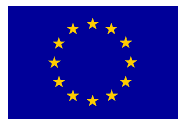
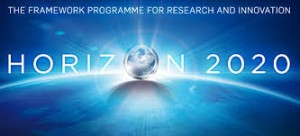
The PD-MitoQUANT project (2019-2022) is an academia-industry consortium, coordinated by Professor Jochen Prehn, director of the Centre for Systems Medicine, RCSI, which has received funding from the Horizon 2020 Innovative Medicines Initiative (IMI) to investigate mitochondrial dysfunction in Parkinson’s disease (PD). The PD-MitoQUANT consortium leverages multi-disciplinary expertise in the fields of PD, mitochondrial function, neuronal biochemistry, and systems biology. Through integrated in vitro, in vivo and in silico approaches, PD-MitoQUANT will perform thorough and unprecedented investigations of mitochondrial dysfunction in PD, identify and validate novel disease biomarkers, and propose innovative therapeutic targets. PD-MitoQUANT will initiate a European research platform of excellence in PD that will continue beyond the project, providing long-term and sustainable progress in the understanding of mitochondrial dysfunction in PD, towards clinical application.
Click here for more information on this project
PI’s there are 13 Partners in this IMI
Prof Jochen Prehn is the lead Coordinator
please click here for more information on the partners
*******************************************************************************

Network of Centres of Excellence in Neurodegeneration (CoEN)
The COEN initiative is based on a joint programme initially agreed between the Canadian Institutes of Health Research (CIHR), the Deutsche Zentrum für Neurodegenerative Erkrankungen (DZNE, Germany) and the Medical Research Council (MRC, United Kingdom), established in June 2010. The initiative was subsequently joined by the Flanders Institute of Biotechnology (VIB Flanders, Belgium), the Health Research Board (HRB), Ireland / Science Foundation Ireland (SFI), and the Ministero della Salute (MDS, Italy) in October 2011. The Instituto de Salud Carlos III (Spain) and the Ministry of Ministry of Education, Science, Research and Sport of the Slovak Republic joined the initiative in October 2012.
The overall aim of the initiative is to build collaborative research activity in neurodegeneration research across borders, focusing on the critical mass and excellence. COEN is aligned with the broader Joint Programming Initiative in Neurodegeneration (JPND), although it operates as an independent entity.
Click here for more information
Below is a short description of one of the project we and are our collaborators are working on
Carbon-Model: Carbon metabolism systems analysis for the identification of diseaseand patient-specific metabolic and energetic defects in neurodegenerative diseases.
Project Description:
Nerve cells rely heavily on a sufficient supply of carbon sources such as glucose and
amino acids to function, as they are highly specialised cells with limited ability to store
energy. Defects in the supply and/or proper usage of carbon sources have been
identified in several neurodegenerative disorders. These may represent primary,
disease-causing defects, or may critically contribute to disease processes that ultimately
lead to the degeneration of nerve cells. CARBON-MODEL will develop an integrated
platform to pin-point defects in carbon metabolism and energy production in nerve cells.
The approach taken is designed to be applicable to multiple types of neurodegenerative
disorders or individual patient data where new diagnostic, prognostic and stratification
tools are required. CARBON-MODEL will dissect the individual molecular components that regulate carbon metabolism using preclinical disease models and induced pluripotent
stem cell (iPSC)-derived neurons, and will implement computational approaches to fully
integrate and systematically analyse these data. The CARBON-MODEL systems platform
will enable the development of novel biomarkers for diagnosis and the implementation of
therapeutic approaches that correct or ‘rewire’ disease- or patient-specific metabolic and
energetic defects, using mitochondrial disorders and amyotrophic lateral sclerosis as
case studies.
Lead Principal Applicant: Jochen H.M.
Co-applicants; Niamh M. Connolly, Simon Furney
Daniele Bano
Deutsches Zentrum für Neurodegenerative Erkrankungen e. V.
(DZNE) in der Helmholtz-Gemeinschaft, Bonn
CoEN Funding partners: SFI and Deutsches Zentrum für Neurodegenerative Erkrankungen (DZNE), Germany
************************************************************************************
MicroRNA as Novel Diagnostic biomarkers in stroke (MiND)

StAR RCSI Award
Ischaemic stroke is a leading cause of death and major disability resulting from death of brain tissue and focal neurological deficits; however, despite decades of research, treatment options remain limited and the lack of therapeutic treatment strategies is a critical clinical problem. To this end, there is a need for biomarkers as clinically useful diagnostic and prognostic indicators for outcome in patients, improving functional recovery through individualised therapeutic strategies. Such biomarkers have potential to be developed into neuroprotective agents aimed at rescuing ischaemic neurons from irreversible injury, widening the therapeutic window, improving neurological outcome and facilitating brain recovery. Endogenous microRNAs (miRNA) are potent regulators of gene function elevated in a wide range of diseases, with crucial roles as regulators of signalling pathways involved in ischaemia-reperfusion injury.
The overall aim of this research programme is to examine the unique molecular profile present in blood samples from patients suffering ischaemic stroke and to examine the relationship between these blood biomarkers and clinical outcome. This will identify a unique molecular signature associated with ischaemic stroke and provide invaluable information for the development of specific miRNA as clinically relevant diagnostic and prognostic blood biomarkers. Furthermore, identification of potential therapeutic targets has significant potential for better success in the development and translation of novel neuroprotective agents to limit progressive neuronal damage and death in the ischaemic penumbra.
Study Lead: Dr Shona Pfeiffer , Clinical PI’s Prof. David Williams and Prof John Thornton
************************************************************************************
EU Joint Programme – Neurodegenerative Disease Research
Multinational research projects for Pathway Analysis across Neurodegenerative Diseases-
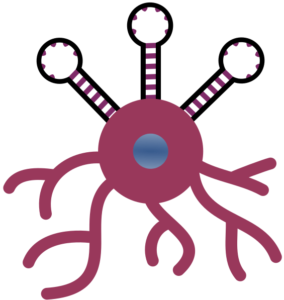

Systems Analysis of novel small non-coding RNA in neuronal stress responses: towards novel biomarkers and therapeutics for neurodegenerative disorders- RNA-NEURO
Motor neuron disease, frontotemporal dementia (FTD) and Parkinson’s disease (PD) all are disorders that lead to the death of nerve cells. The current project aims to identify the disease-specific ‘fingerprint’ of a new class of molecules. These molecules are linked directly to stress responses in nerve cells and are called ‘small non-coding RNAs’. These are small ribonucleic acids that not directly produce proteins, but rather regulate wider biological functions. Of note, these can be detected in various fluids of the body including blood. By systematically analyzing these molecules, we aim to identify whether the detection of these molecules in blood helps in patient diagnosis. Furthermore, we know that certain patients have a rapid and progressive disease, while in other patients the disease is progressing more slowly. We therefore aim to investigate whether such molecules also provide information regarding disease progression, which is important information for doctors and patients alike. Finally, we will explore the function of these small non-coding RNAs, with the ultimate aim to employ these as novel therapeutics, as they may boost defense mechanisms in nerve cells.
List of Collobaroators
Prof Jochen HM Prehn, (Partner 1, Coordinator)
Denmark
Prof Jørgen Kjems, (Partner 2)
Netherlands
Dr Michael van Es (Partner 3)
Italy
Dr Giovanni Nardo (Partner 4)
Canada
Prof Ruth Slack (Partner 5)
Germany
Prof Mark Helm (Partner 6)
******************************************************************************
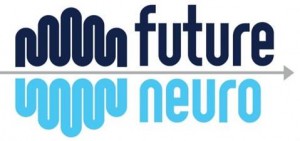
FutureNeuro brings together internationally recognised neuroscientists, clinical neurologists, geneticists, cell-biologists, analytical and materials chemists from five different third level institutions (RCSI, TCD, UCD, DCU, NUI Galway) as well as a wider network of clinical neurologists and other collaborators based around the country.
As part of a work package 7 of Future Neuro
Aim: To perform a systematic analysis of tiRNA – protein complexes in ALS and Epilepsy models as well as samples from patients. Binding of tiRNA to protein complexes protect tiRNA from degradation and impacts on their stability, detection ability and function. tiRNA may represent novel regulators of protein translation and miRNA function and represent novel therapeutic targets for neurological disorders. The natural spectrum of tiRNA accumulating in ALS and epilepsy is unknown. Using the pre-clinical mouse models of ALS (SOD1 mt, Fus nt, and TDP-43 mt mice) and epilepsy, we will assess tiRNAs and the composition of tiRNA complexes in these animal models. The researcher will profile tiRNA fragments to establish the profile and compostion of tiRNAs. Please click on the link below for more information
https://www.futureneurocentre.ie/diseases/motor-neurone-disease/
PI: Prof Jochen Prehn
************************************************************************************
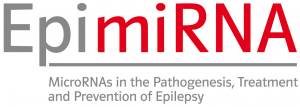

The EpimiRNA consortium (formed in mid-2012), involving 16 partners from 8 European countries, the USA and Brazil has received €11.5 million funding from the European Union’s Framework Programme 7 to investigate molecular mechanisms, diagnostics and treatments for epilepsy.
The overall objective of the EpimiRNA consortium is to explore the role of microRNAs in the development, treatment and diagnosis of temporal lobe epilepsy. Scientists will undertake the first complete analysis of microRNA changes across multiple epilepsy models and human brain tissue to identify the active or missing microRNAs in epilepsy. Experiments will then uncover the targets of these microRNAs and, using the latest computer and mathematical modelling techniques, explain how they influence brain excitability. We will look at the genetic code in patients with temporal lobe epilepsy to see if variation or errors may be changing which microRNAs are present in the brain. We will target microRNAs using gene therapy and other approaches and we will search chemical libraries for new compounds which might affect microRNA levels in cells. Seizures or the injuries that trigger epilepsy may cause the release of tiny amounts of microRNA into the bloodstream which can be detected with very sensitive machines. Clinical trials will therefore look at microRNA levels in blood samples from patients. This may lead to non-invasive tests to help doctors predict who may develop epilepsy or respond best to a particular treatment.
Jochen Prehn and the Centre for Systems Medicine are contributing to EpimiRNA with expertise in Systems biology. These approaches are increasingly required to tackle the complex regulation of biological function and disease processes by miRNA. miRNA target multiple mRNA, and each mRNA can be targeted by several miRNA. Recognizing this complexitiy, it is essential to integrate information on miRNA and their mRNA/protein targets as well as spatio-temporal data in the brain. This workpackage will establish an integrative computational model that allows the miRNA and target data to undergo mechanistic analysis, prediction testing, and simulation of effects on neuronal excitability.
Consortium members
The Consortium is coordinated by Professor David Henshall, Royal College of Surgeons in Ireland with Professor Felix Rosenow at Philipps University Marburg (Germany) as Co-coordinator , with the following partners: Professors Jochen Prehn, Gianpierro Cavalleri and Norman Delanty also from the RCSI in Dublin, Professors Gerhard Schratt, Carsten Culmsee and Rainer Schwarting and Karl M. Klein PhD at Philipps University Marburg (Germany), Prof. Jeroen Pasterkamp at the University Medical Center Utrecht (Netherlands), Dr Stephanie Schorge at University College London (U.K.), Prof. Paolo Fabene at the University of Verona (Italy), Prof. Hajo Hamer at Friedrich-Alexander Universität Erlangen/Nuernberg (Germany), Prof. David Goldstein at Duke University (U.S.A.), Prof. Iscia Lopes-Cendes at University of Campinas (Brazil), Prof. Jorgen Kjems at Aarhus University (Denmark) and Prof. Jens Andersen at University of Southern Denmark (Denmark). The consortium is accompanied by experienced companies: DIXI Microtechniques (France), Cerbomed GmbH (Germany), InteRNA Technologies (Netherlands), Bicoll GmbH (Germany-China), BC Platforms (Finland) and GABO:mi (Germany).
This project has received funding from the European Union’s Seventh Framework Programme for research, technological development and demonstration under grant
agreement 602130.
See the video where Prof David Henshall is speaking about this project